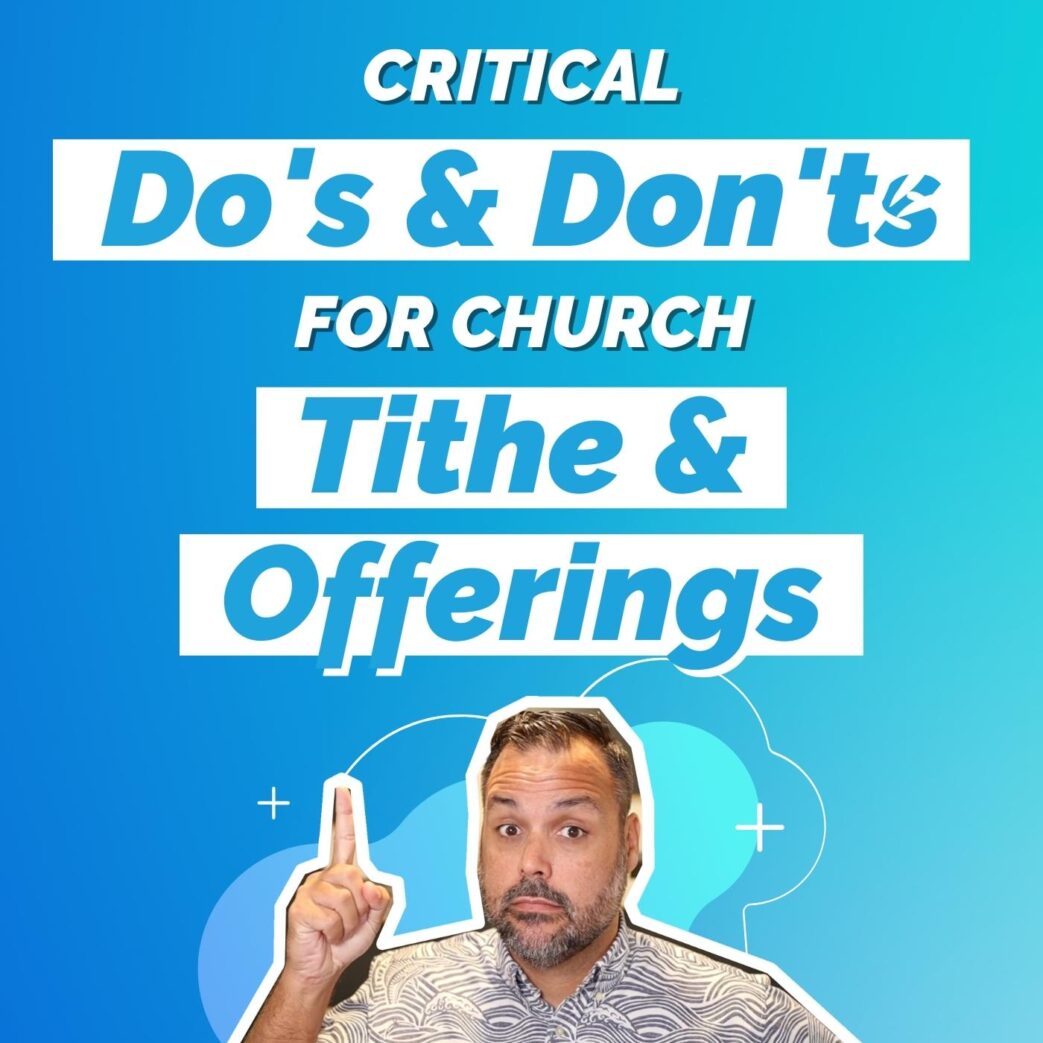Financial giving can be a sensitive subject for churches, but the Bible has a lot to say about money. Talking about tithes and offerings is essential for the church’s growth and for the individuals who give.
You may have heard this, but the Bible has 2,350 scriptures on finances, giving, and our attitude toward money and wealth. Giving is about much more than simply supporting the church’s budget!
So, when and how you discuss tithes and offerings in your church service can make a tremendous difference. Let’s dive in and cover everything you need to know about tithes and offerings. And what you should and shouldn’t do when it comes to that part of your services.
Estimated reading time: 11 minutes
Table of contents
- Why Are Tithes and Offerings Important?
- When Should You Talk About Tithes and Offerings?
- How Should You Talk About Tithes and Offerings in Church Service?
- Practicals on Tithes and Offerings in Church Service
- Do’s and Don’ts of Tithes and Offerings
- Church Tithes and Offerings
- More Resources on Church Giving
Why Are Tithes and Offerings Important?

Money is a touchy subject. Although it’s bad form to talk about finances at a dinner party, we’re called to preach the whole Bible. Therefore, we’d be remiss not to teach on giving and how to manage money. Jesus wasn’t afraid to talk about money or people’s attitude toward wealth, and we shouldn’t be either.
This subject touches on deeply rooted beliefs and values such as our sense of security, our attitude towards work, and ultimately our trust in God to provide for us. Deuteronomy 8:18 says, “But remember the Lord your God, for it is he who gives you the ability to produce wealth.”
God is concerned with our financial well-being. Tithes and offerings are one way that we can honor Him with our resources. When we give, we acknowledge that everything we have belongs to God. We are simply returning what He has generously given to us.
We are also committing to using our resources in a way that will please Him, help others, and impact the world around us to advance the kingdom. And when we give generously and cheerfully, it is an act of worship that brings joy to God’s heart (2 Corinthians 9:7).
Tithing in the Bible
In the Bible, tithing refers to giving one-tenth of one’s income or possessions as an offering to God. This practice dates back to ancient times and is mentioned in the Old Testament, particularly in the book of Leviticus.
The Israelites were instructed to give tithes to support the priests and the maintenance of the tabernacle. All the tithes were meant to support those who were devoted to ministering to the Lord rather than regular work. This act of giving was considered a sign of obedience and gratitude to God for His provision.
Offerings
Offerings, on the other hand, go beyond the obligatory tithe and represent voluntary gifts given out of a cheerful heart. In the New Testament, Jesus Christ Himself praised the act of giving generously and sacrificially. He taught that God loves a cheerful giver, emphasizing the importance of giving with joy and gratitude rather than compulsion.
The Apostle Paul also encouraged believers to give offerings according to their means, highlighting the spiritual benefits of giving and the blessings that come from supporting the work of God’s kingdom.
While tithes are a prescribed practice in the Bible, offerings demonstrate a deeper level of commitment and devotion to God. Both reflect the principle that God loves a cheerful giver, and they serve as acts of worship and obedience to Him.
When Should You Talk About Tithes and Offerings?

The timing for tithes and offerings primarily impacts your newer guests. Veteran church members know you’ll have a time for giving at some point in the service, and usually don’t think too much about it.
On the other hand, new guests might be taken aback or caught off guard by an ill-timed or poorly presented call for tithes and offerings.
We can’t give you an undisputed best time for doing your offering, but here are some general thoughts.
Beginning of Service
From the church’s perspective, it might be nice to talk about tithes and offerings at the beginning of service to get it over and done. However, you don’t want that to be your new guest’s first impression. Talking about the offering right out of the gate will confirm one of the worst stereotypes about churches that skeptics have: “churches just want your money.”
Middle of Service
Giving is a form of worship, so many churches mention tithes and offerings following the worship (singing) service, perhaps along with prayer and church announcements. However, without the right timing and tone, shifting to the topic of giving can feel like a bait-and-switch or simply abrupt and jarring.
End of Service
Other churches choose to end their service with tithes and offering. Although you may lose some people who are checking out physically or mentally, waiting until the end of service to bring up the subject feels right for many churches.
Whatever moment you choose, it’s good form to discuss giving as an act of worship and pray over people’s offerings. Ultimately, only you can decide the best moment for tithes and offerings for your church and service flow!
How Should You Talk About Tithes and Offerings in Church Service?

We know of some churches that don’t mention an opportunity to give from the stage or pulpit. Some will simply pass buckets at a designated time in service (although we know most people are giving online rather than in person, this can still serve as a physical reminder).
The main problem with a “silent” give is that most people don’t understand the importance and biblical precedent for church tithing unless it’s explained to them and they have some teaching on this subject.
Other churches have giving boxes or kiosks available and may advertise ways to give through bulletins, slides, or perhaps in the announcement video.
One benefit of using video is getting the wording just right, which is helpful when you’re covering a sensitive subject. But, on the other hand, it may come across as impersonal and too much like a business transaction when mentioned in a recorded announcement versus a teaching and prayer moment from a live speaker.
Finally, most churches we see have a live speaker announcing the opportunity to give, usually providing some background or a story, a scripture, and prayer. Here are some final thoughts on the delivery of that service segment.
Practicals on Tithes and Offerings in Church Service

The act of taking tithes and offerings during a church service is an essential aspect of worship and stewardship within the church community. From traditional methods to modern digital platforms, various practical approaches are employed to ensure a smooth and meaningful experience for congregants.
Traditional Collection Methods
Traditionally, tithes and offerings were collected during church services through physical means, such as passing around offering plates or baskets. This practice allows members to participate in giving by placing their contributions directly into the collection receptacle.
As the plates are passed from person to person, members have the opportunity to give their offerings while reflecting on the importance of generosity and stewardship.
Additionally, some churches provide designated offering envelopes for members to use, allowing them to indicate the amount of their tithe and any special designations for their offering. These envelopes may also include spaces for prayer requests or messages of encouragement, fostering a sense of community and connection among church members.
Online Giving
In recent years, online giving has emerged as a convenient and secure method for collecting tithes and offerings during church services. Through mobile apps, websites, or text-to-give services, congregants can make their contributions electronically from anywhere at any time.
This flexibility is particularly valuable for individuals who may be unable to attend in-person services or prefer the convenience of digital transactions.
Online giving platforms also offer features such as recurring donations and donation tracking, allowing members to set up automated contributions and monitor their giving history. By embracing online giving, churches can streamline the giving process, increase financial transparency, and accommodate the preferences of a tech-savvy congregation.
Culture of Generosity
Regardless of the method used to collect tithes and offerings, the underlying principle remains the same: God blesses a generous person. As church leaders and members steward the resources entrusted to them, they have the opportunity to cultivate a culture of generosity within the local church community. This involves not only giving financially but also offering time, talents, and resources to support the ministry and mission of the church.
Furthermore, transparent communication about how tithes and offerings are used helps build trust and accountability within the congregation. Sharing testimonies of how God has blessed the church through faithful giving encourages members to continue investing in the work of the kingdom.
The practicalities of taking tithes and offerings during a church service encompass a range of methods, from traditional collection plates to modern online platforms. Regardless of the approach, the goal remains the same: to honor God with our resources and to support the ministry and mission of the local church.
Through faithful stewardship and a spirit of generosity, Christians can experience the joy of giving and witness how God blesses their obedience.
Do’s and Don’ts of Tithes and Offerings

There are some critical do’s and don’ts when discussing tithes and church service offerings. With the right approach, your church can emphasize giving as an act of worship that is vital to the health and growth of your congregation.
These are not hard-and-fast rules. They are more suggestions to help facilitate a more healthy and respectful environment for tithes and offerings. We encourage you and your church to apply as many of these principles as possible. Of course, we ultimately petition you to take everything to the Lord and trust in His guidance.
With all of that being said, let’s jump in.
Tithes and Offerings Do’s
First off, let’s cover some of the things we belive you should do while taking tithes and offerings. These range from the way you talk about them and present them and the way you collect them.
- Do support your discussion of tithes and offering with applicable scriptures. For example, check out our post with 18 Scriptures on Giving.
- Do make it voluntary and anonymous. Focus on the principle of giving and biblical basis over the actions of any individual.
- Do stay theologically sound. Avoid the temptation to promise people a specific outcome or guaranteed reward for giving that strays from what we see in Scripture.
- Do offer a disclaimer for new visitors. It can be helpful to specify that this portion of service is for regular attendees and if it’s someone’s first time there’s no expectation for them to give.
Tithes and Offerings Don’ts
Now let’s cover some of the things you shouldn’t do regarding tithes and offerings.
- Don’t make it the main focus of your service. Tithes and offerings are one part of the big picture.
- Don’t put pressure on people to give. Never make people feel like they’re being watched or judged based on how they give.
- Don’t make people feel manipulated. Tithes and offerings shouldn’t be tied to emotional hype, sensational tear-jerker stories, or false promises.
- Don’t joke about taking people’s money. It’s tempting to use humor to lighten the mood when discussing a loaded subject like giving. But you should avoid anything that could be misconstrued, offensive, or cringey.
Church Tithes and Offerings

To sum up, tithes and offerings are fundamental aspects of faith and community. Giving back to God shows gratitude for His blessings and supports the church’s mission. Remember, it’s not about the amount, but the heart behind the giving.
Whether through traditional methods or modern technology, every contribution makes a difference. By giving cheerfully and faithfully, believers participate in God’s work and experience His blessings. Let’s continue to prioritize generosity and stewardship, knowing that our contributions help spread love and hope to others.
What other tips would you add for churches mentioning tithes and offerings? Let us know in the comments!
More Resources on Church Giving





